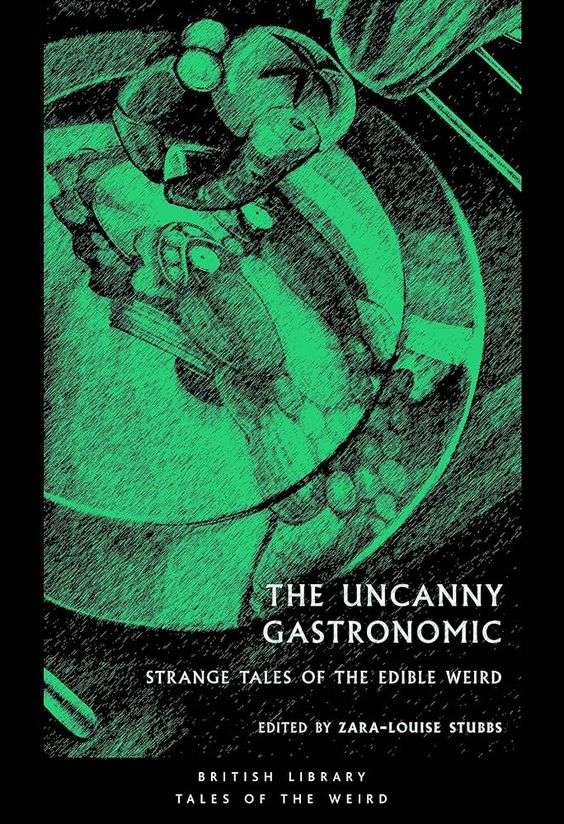We’ve implemented some new protocols around sending us messages via this website. Please email website “at” britishfantasysociety “dot” org for any issues.

For all things fantasy, horror, and speculative fiction
-
Announcement:

The Uncanny Gasronomic
The Uncanny Gastronomic – Strange Tales of the Edible Weird
Edited by Zara-Louise Stubbs
British Library, s/b, £9.99
Reviewed by Matthew Johns

The latest in the series of British Library Tales of the Weird, this carefully curated collection of tales from the nineteenth and twentieth centuries are all themed around food and eating. With stories from luminaries such as Franz Kafka, Roald Dahl, Mark Twain, Virginia Woolf and even Edgar Allen Poe himself, this is a very eclectic mix.
The collection opens with a poem from Robert Browning – ‘The Laboratory’. 12 short verses tell the story of a lady planning to poison women who vie for her lover’s affection. M.F.K. Fisher’s ‘The Measure of My Powers’ swiftly follows, in which the protagonist reminisces about a cook her family had when she was young who introduced them to delicious, tasty food when previously they had existed only on tasteless food to satisfy the medical needs of her grandmother.
Franz Kafka’s ‘A Fasting-Artist’ is an intriguing tale. It recounts the story of the eponymous and unnamed fasting artist – a man who starves himself as a sideshow attraction. He bemoans the fact that his “art” used to be a major attraction in cities and towns, but now he is forced to tour with a circus, confined to a cage by the other animals with infrequent visitors.
Christina Rossetti’s ‘The Gobin Market’ is another poem – much longer than the opener from Browning. It tells of two sisters visiting a goblin market and one submitting to the temptation to buy and consume forbidden foodstuffs from it. She then begins to pine and waste away as once she has eaten from the market, it disappears, and she cannot find it again. Her faithful and loving sister then seeks out the market to acquire more of the food to cure her dying sister.
Roald Dahl’s ‘Pig’ is about an orphan boy who goes to live with his Great Aunt, a staunch vegetarian. As he grows, he shows an interest in food and becomes an excellent chef, creating all manner of delicious-sounding vegetarian food, never tasting meat until after she dies. He then decides he must visit a disreputable slaughterhouse to see how pigs are prepared and finds himself facing the same fate as the pigs.
This book contains a real mix of stories – a veritable tasting menu if you like. I personally enjoyed many of them but found that not all were to my taste. However, that is one of the many joys of the British Library collections – you get to experience stories by authors you would never have heard of or considered before. You can guarantee that the vast majority will be enjoyable, and you’ll read tales by well-known authors that you may never see elsewhere.
Explore the blog:
Blog categories:
Latest Posts:
Tags:
#featured (56) #science fiction (25) Book Review (264) events (44) Fantasy (231) Graphic Novel (13) horror (136) Members (62) Orbit Books (48) profile (43) Romance (17) Science Fiction (50) short stories (28) Titan Books (52) TV Review (15)
All reviews
Latest Reviews:
- THE HOUSE ON THE BORDERLAND by William Hope Hodgson
- Monstrum by Lottie Mills
- Mood Swings by Dave Jeffery
- Yoke of Stars by R.B. Lemberg
- Hera by Jennifer Saint
- The Black Bird Oracle by Deborah Harkness
- RETURN OF THE DWARVES By Markus Heitz
- Delicious in Dungeon
- Toxxic by Jane Hennigan
- THIS ISLAND EARTH: 8 FEATURES FROM THE DRIVE-IN By Dale Bailey
Review tags:
#featured (2) Action (4) Adventure (4) Book Review (28) Fantasy (18) Featured (2) Feminist (2) Gothic Horror (3) Horror (14) Magic (3) Orbit Books (3) Romance (6) Science Fiction (5) Swords and Sorcery (2) Titan Books (7)